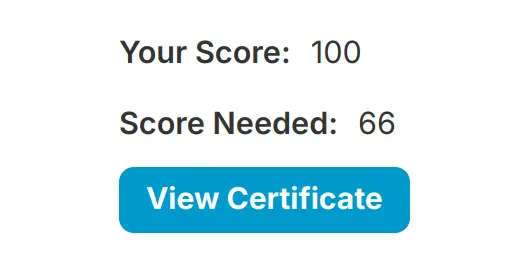I recently took the plunge and sat for the Certified Kubernetes Administrator (CKA) exam. Spoiler alert: I nailed it with a 100% score! 🎉

I’m here to share the nitty-gritty details of my prep, the resources that saved my bacon, and the lessons I learned along the way. So, grab a coffee (or your beverage of choice), and let’s dive in!
The Udemy Detour
Like many of you out there, I kicked off my CKA prep with the much-hyped Udemy course by KodeKloud. Don’t get me wrong, it’s a solid course. But here’s the thing – I’ve been knee-deep in Kubernetes admin work for a while now, so a lot of it felt like preaching to the choir.
Was it a complete waste of time? Nah. It served as a decent refresher, helping me dust off some cobwebs in areas I don’t touch daily. But if I’m being honest, it wasn’t the game-changer I thought it would be. For those of you already working with Kubernetes, you might find yourself in the same boat.
The Real MVP: killer.sh
Now, let’s talk about the resource that truly turned the tables for me – the simulator over at killer.sh. This thing is the real deal. It’s like the exam’s identical twin – same look, same feel, same “oh crap, the clock is ticking” anxiety.
What made it so crucial? A few things:
- It’s a carbon copy of the exam interface. No surprises on D-day.
- It forced me to manage my time like a pro. Trust me, in the real exam, every second counts.
- The scenarios? Even a bit tougher than the real CKA exam.
I can’t stress this enough – if you’re serious about acing the CKA, the killer.sh simulator is your new best friend. It’s the closest you’ll get to the real thing without actually taking the exam.
Two 36h simulator sessions come free of charge with every CKA examination - so make use of it!
The Secret Weapon: KillerCoda
While killer.sh was my main squeeze, I found a fantastic sidekick in KillerCoda’s CKA practice environment.
This platform threw a mix of questions and scenarios at me that really kept me on my toes.
What I loved about KillerCoda:
- The variety of questions. It wasn’t just rehashing the same old stuff.
- Hands-on practice. Because let’s face it, in Kubernetes, theory only gets you so far.
- It exposed gaps in my knowledge I didn’t even know existed.
Between killer.sh and KillerCoda, I felt like I had all bases covered. They complemented each other perfectly, giving me a well-rounded prep experience.
My Two Cents on Acing the CKA
Alright, time for some unsolicited advice (hey, you’re still reading, aren’t you?):
-
Use your work experience: If you’re already in the Kubernetes trenches, lean into that knowledge. Focus your study time on the areas you don’t touch often in your day job. Especially
NetworkPoliciesandetcdrelated maintenance comes in handy. -
Embrace the pressure: Use the
killer.shsimulator to get comfortable with the exam’s time crunch. It’s as much about speed as it is about knowledge. -
Mix it up: Don’t just stick to one resource. The combination of
killer.shandKillerCodaworked wonders for me. -
Speed and accuracy are key: In the exam, you need to be quick, but not at the cost of accuracy. Practice finding that sweet spot.
-
Know your basics cold: Make sure you’ve got a rock-solid grasp on networking, storage, and security in Kubernetes. These fundamentals will save you when you’re in a pinch.
Wrapping Up
Scoring 100% on the CKA was a trip, I’m not gonna lie. It validated all those late nights troubleshooting clusters and the countless hours spent tinkering with Kubernetes. But here’s the real talk – your journey might look different from mine, and that’s okay.
The key is to find what works for you. Maybe you’ll swear by that KodeKloud course, or perhaps you’ll find another resource that clicks. The important thing is to keep pushing, keep learning, and remember why you started this journey in the first place.
👨💻🚀
